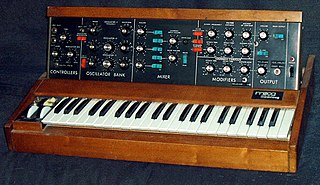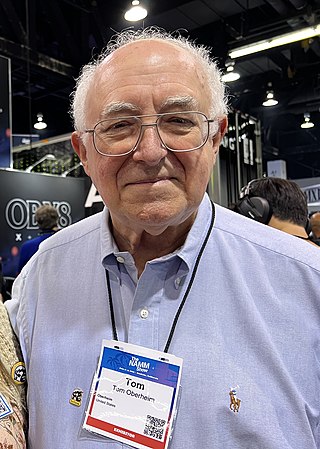
A digital synthesizer is a synthesizer that uses digital signal processing (DSP) techniques to make musical sounds. This in contrast to older analog synthesizers, which produce music using analog electronics, and samplers, which play back digital recordings of acoustic, electric, or electronic instruments. Some digital synthesizers emulate analog synthesizers; others include sampling capability in addition to digital synthesis.

Robert Arthur Moog was an American engineer and electronic music pioneer. He was the founder of the synthesizer manufacturer Moog Music and the inventor of the first commercial synthesizer, the Moog synthesizer, which debuted in 1964. In 1970, Moog released a more portable model, the Minimoog, described as the most famous and influential synthesizer in history. Among Moog's honors are a Technical Grammy Award, received in 2002, and an induction into the National Inventors Hall of Fame.

Digital music technology encompasses digital instruments, computers, electronic effects units, software, or digital audio equipment by a performer, composer, sound engineer, DJ, or record producer to produce, perform or record music. The term refers to electronic devices, instruments, computer hardware, and software used in performance, playback, recording, composition, mixing, analysis, and editing of music.
A music sequencer is a device or application software that can record, edit, or play back music, by handling note and performance information in several forms, typically CV/Gate, MIDI, or Open Sound Control, and possibly audio and automation data for digital audio workstations (DAWs) and plug-ins.

An analog synthesizer is a synthesizer that uses analog circuits and analog signals to generate sound electronically.

Oberheim is an American synthesizer manufacturer founded in 1969 by Tom Oberheim.
Electronic Music Studios (EMS) is a synthesizer company formed in Putney, London in 1969 by Peter Zinovieff, Tristram Cary and David Cockerell. It is now based in Ladock, Cornwall.

Moog Music Inc. is an American synthesizer company based in Asheville, North Carolina. It was founded in 1953 as R. A. Moog Co. by Robert Moog and his father and was renamed Moog Music in 1972. Its early instruments included the Moog synthesizer, followed by the Minimoog in 1970, both of which were highly influential electronic instruments.

The Moog synthesizer is a modular synthesizer invented by the American engineer Robert Moog in 1964. Moog's company, R. A. Moog Co., produced numerous models from 1965 to 1981, and again from 2014. It was the first commercial synthesizer and established the analog synthesizer concept.
Dave Amels is an American musician and record producer who co-founded music technology companies Voce musical instruments and Bomb Factory. Both companies are known for detailed and realistic mathematical models of complex physical systems. Amels also plays organ in The Reigning Sound, a garage rock band out of Asheville, North Carolina.
Brian Kehew is an American musician and record producer. He is a member of The Moog Cookbook and co-author of the Recording The Beatles book, an in-depth look at the Beatles' studio approach.

Moogerfooger is the trademark for a series of analog effects pedals manufactured by Moog Music. There are currently eight different pedals produced; however, one of these models is designed for processing control voltages rather than audio signal. A sixth model, the Analog Delay, was released in a limited edition of 1000 units and has become a collector's item. Moog Music announced on August 28, 2018, that the Moogerfooger, CP-251, Minifooger, Voyager synthesizers, and some other product lines were being built using the remaining parts on hand and discontinued thereafter.
Arturia is a French electronics company founded in 1999 and based in Grenoble, France. The company designs and manufactures audio interfaces and electronic musical instruments, including software synthesizers, drum machines, analog synthesizers, digital synthesizers, MIDI controllers, sequencers, and mobile apps.

Thomas Elroy Oberheim, known as Tom Oberheim, is an American audio engineer and electronics engineer best known for designing effects processors, analog synthesizers, sequencers, and drum machines. He has been the founder of four audio electronics companies, most notably Oberheim Electronics. He was also a key figure in the development and adoption of the MIDI standard. He is also a trained physicist.
Walter Edmond Sear was an American recording engineer, musician, instrument importer and designer, inventor, composer and film producer. He was considered a pioneer in the use of the synthesizer and an expert on vintage recording equipment. Sear ran the Sear Sound recording studio in Hell's Kitchen, known for its vast collection of vintage analog recording equipment and patronized by artists including Steely Dan, Sonic Youth, David Bowie, Wynton Marsalis, Paul McCartney and Patti Smith.

A synthesizer is an electronic musical instrument that generates audio signals. Synthesizers typically create sounds by generating waveforms through methods including subtractive synthesis, additive synthesis and frequency modulation synthesis. These sounds may be altered by components such as filters, which cut or boost frequencies; envelopes, which control articulation, or how notes begin and end; and low-frequency oscillators, which modulate parameters such as pitch, volume, or filter characteristics affecting timbre. Synthesizers are typically played with keyboards or controlled by sequencers, software or other instruments and may be synchronized to other equipment via MIDI.

The Little Phatty is a monophonic analog synthesizer manufactured by Moog Music from 2006 to 2013, preceded by the Voyager and succeeded by Voyager Old School. Its design was conceived, in part, by Robert Moog himself, and is the last instrument to have that distinction, although the primary engineer was Cyril Lance. It is also the first Moog product to be produced following his death. Jordan Rudess of the band Dream Theater also assisted with the design of the product.

Sound City Studios is a recording studio in Los Angeles, California, known as one of the most successful in popular music. The complex opened in 1969 in the Van Nuys neighborhood of Los Angeles. The facility had previously been a production factory of the English musical instrument manufacturer Vox. Throughout the late twentieth century, the studio became known for its signature sound, especially in recording drums and live performances of rock bands.

The Arturia MiniBrute is a synthesizer manufactured by Arturia. Although the MiniBrute was the first piece of analog hardware created by Arturia—which had previously exclusively marketed software synthesizers—it generated strong sales.












